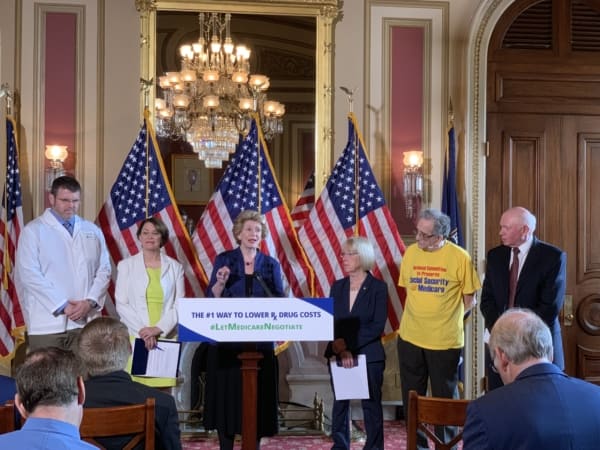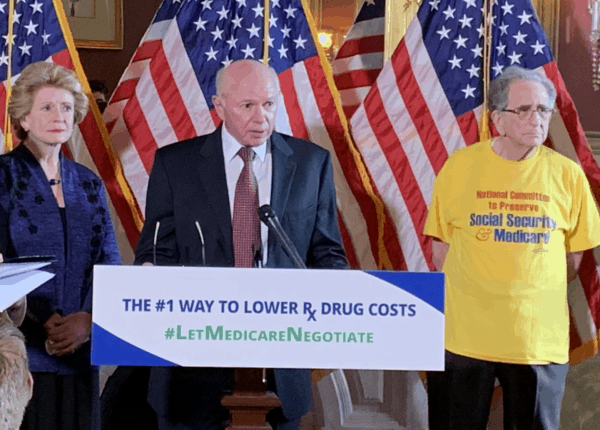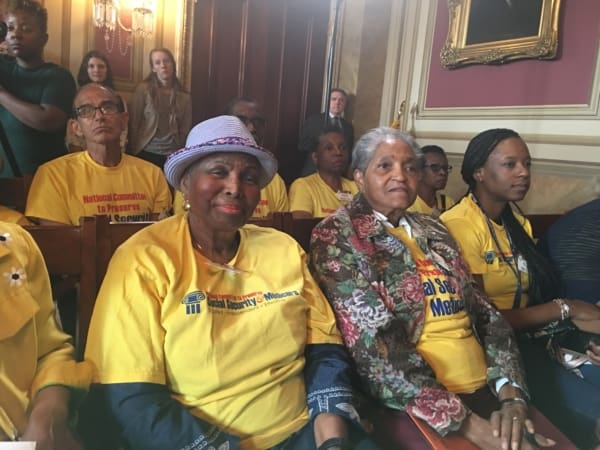
Four influential Democratic Senators delivered a message to their Republican colleagues and President Trump today: allowing Medicare to negotiate directly with Big Pharma is the best way to bring down prescription drug prices. In a press conference at the U.S. Capitol, Sens. Debbie Stabenow (D-MI), Amy Klobuchar (D-MN), Patty Murray (D-WA), and Chris Murphy (D-CT) emphasized the importance of Medicare drug price negotiation as the Senate considers multiple proposals to lower prescription costs.
“Prescription drug pricing is the ultimate example of a rigged system that needs to be unrigged to bring costs down.” – Sen. Debbie Stabenow (D-MI), 6/12/19
National Committee president Max Richtman joined the Senators at the podium as the prime spokesperson for the seniors’ advocacy community – accompanied by a group of yellow t-shirted volunteers from the organization’s Capital Action Team.
“People are dying — or their quality of life is poor — because high drug prices are forcing seniors to go without life-saving medications. It’s time to end pharma’s drug price gouging. It’s time to stop forcing seniors to cut their pills in half or skip a dose. That’s why the National Committee urges the Senate to approve legislation that would allow Medicare to negotiate prescription drug prices.” – National Committee president Max Richtman, 6/12/19

National Committee president Max Richtman at the U.S. Capitol today
Richtman cited the anti-inflammatory Humira as an example of “out of control drug pricing.” The medication, which treats conditions including arthritis, Crohn’s disease, and colitis, retailed for $19,000 in 2012. Today, it costs a little over $40,000. The price essentially doubled in 7 years.
“Thankfully, seniors with Medicare Part D don’t have to shoulder the full cost. But at over $5,400 a year – their out of pocket cost for Humira is not cheap. Given that the income of half of Medicare beneficiaries is less than $26,200 a year, the cost of Humira alone is 22% of their income.” – Max Richtman, 6/12/19
John Glaser, an 80 year-old National Committee volunteer who suffers from diabetes, told the Senators that his prescription drug costs were so high in 2017 – over $5,000 – that he went through the Medicare Part D coverage ‘donut hole’ and soon hit the program’s catastrophic cap. “Allowing Medicare to negotiate prices [with Big Pharma] would be a benefit for me and millions of other seniors,” Glaser said.
One of the other Capital Action Team volunteers, Pat Cotton, told Entitled to Know that she takes a relatively new drug for myelofibrosis called Jakafi. Cotton said when she started the medication three years ago it cost $10,000 per month but now has jumped 40% to $14,000. She relies on Medicare, supplemental insurance, and a manufacturer’s subsidy to afford the drug. When the insurance company tried to take the subsidy away, she told them, “This drug is saving my life. If you take away the subsidy, you’re killing me.” (The subsidy was restored – but the drug no doubt will continue to climb in price.)

National Committee volunteer Patricia Cotton says her medication jumped from $10,000 to $14,000 per month in three years
Glaser and Cotton are among the 43 million seniors and disabled in Medicare Part D whose purchasing power the Senators would like to leverage. Senator Klobuchar insisted that by allowing the Secretary of Health and Human Services to negotiate drug prices for Medicare, costs would eventually fall for patients of all ages. Klobuchar has introduced legislation in the Senate to lift the ban on Medicare negotiating with Big Pharma. The bill already has more than 30 cosponsors, but cannot pass without Republican support.
“I thought Republicans liked negotiation, competition, and free markets. This bill unleashes the market power of Medicare and evens the playing field.” – Sen. Amy Klobuchar (D-MN), 6/12/19
Klobuchar said that Republicans are under pressure from the electorate to lower prescription drug prices in the wake of the 2018 midterm elections. She also noted that during the 2016 campaign, President Trump voiced support for Medicare negotiating drug prices with pharmaceutical companies – but has yet to embrace any proposal to allow it.
Max Richtman insisted that it’s something the public clearly supports, pointing to polling that indicates over 90% of Americans want Medicare to be allowed to negotiate drug prices. According to AARP, Medicare could have saved more than $14 billion dollars on the top 50 prescription drugs in 2016 had the policy been in place.


